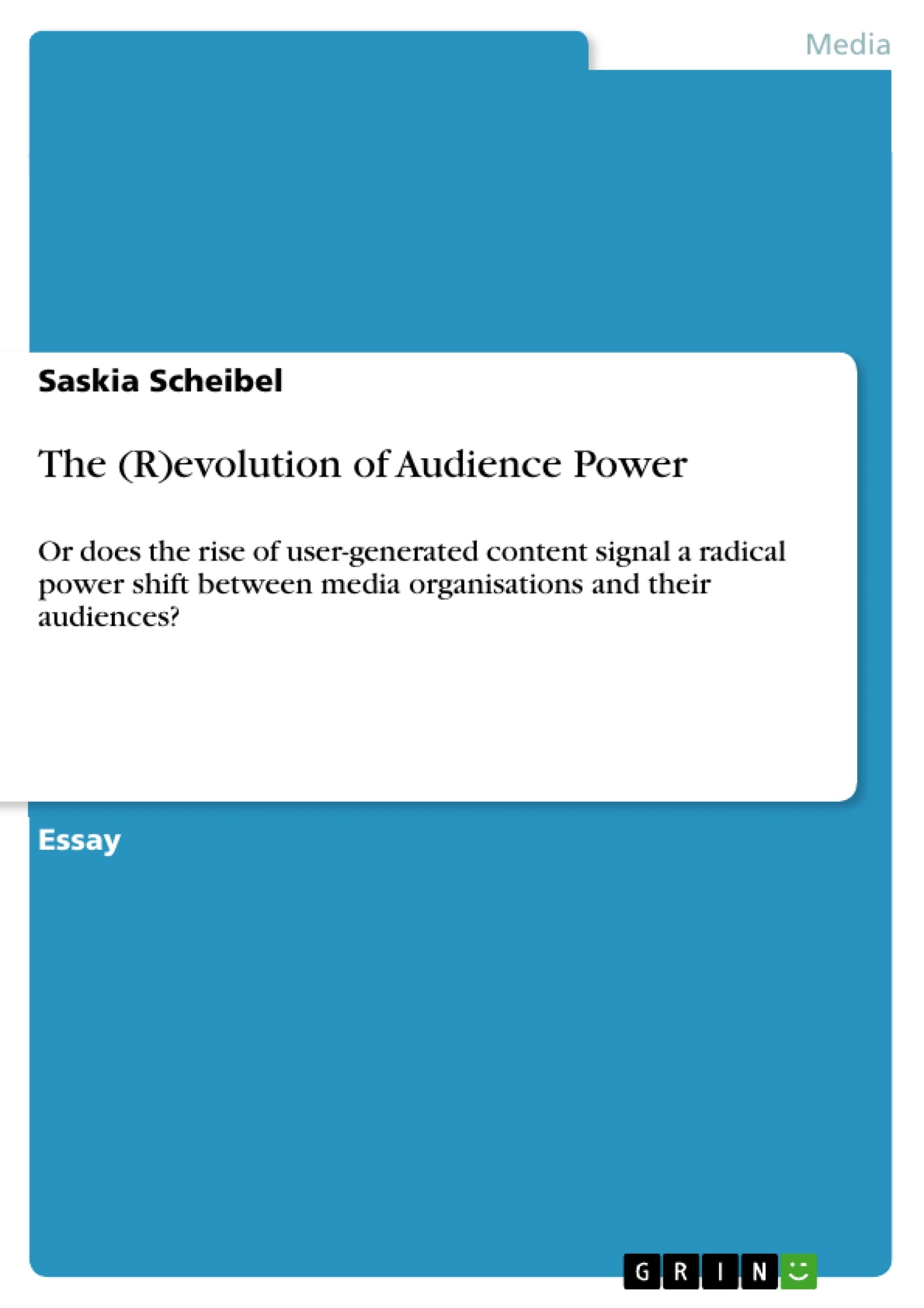“Will the internet set us free?” is the provoking question McChesney (1999) raised a decade ago (pp. 119). By this he means if new modes of communication will relativise the supposed dominant power of media organisations. It would not be the first time in the history of media that a new form of media challenges the power of established media organisations (Curran, 2002). Especially with the rise of user-generated-content – finally enabling the audience to create their own meanings (Bruns, 2007) – has undeniable potential to break with old power structures in favour of the audience. This power shift, however, might just be a moment of euphoria rather than a long-term condition since it seems unlikely that big corporate media organisations will witness their disempowerment passively. The following discourse will illustrate why a power shift between media organisations and their audiences is, indeed, visible but cannot be considered radical. This notion will be supported by examples of empirical research taking into account the complex nature of power relations and the contradicting views related to media power before and after the rise of user-generated-content.
Inhaltsverzeichnis (Table of Contents)
- Introduction
- The concept of power in the context of media
- Power relations before the rise of user-generated-content
- The rise of user-generated content: evolution or revolution of power relations?
Zielsetzung und Themenschwerpunkte (Objectives and Key Themes)
This discourse examines the power shift between media organisations and audiences in the context of user-generated content. It explores whether the rise of user-generated content has led to a radical power shift, empowering audiences and undermining traditional media power structures.
- The evolving nature of power relations in media and communications.
- The role of user-generated content in shaping media landscapes and audience engagement.
- The interplay between traditional media power structures and the potential for audience empowerment.
- The impact of user-generated content on media agendas and political discourse.
- The limitations and challenges of user-generated content in fostering a truly democratic media system.
Zusammenfassung der Kapitel (Chapter Summaries)
- Introduction: The introduction sets the stage by examining McChesney’s question about the internet's potential to liberate audiences from traditional media power. It highlights the potential of user-generated content to disrupt established power structures, but also questions whether this shift is truly radical or just a temporary phenomenon.
- The concept of power in the context of media: This chapter explores different conceptions of power in media, drawing on theories by Weber, Dahl, and others. It emphasizes the relational nature of power and how it is exercised through control of information and communication. The concept of the "power elite," as defined by Mills, is introduced to illustrate the concentration of media power.
- Power relations before the rise of user-generated-content: This chapter examines the historical debate on media power, focusing on the "radical" view, which suggests media control over audiences, and the "liberal" view, which emphasizes audience agency. It explores theories of media effects, including the cultivation theory, priming, and the Elaboration Likelihood Model, which suggest media influence on audience perception and behaviour. It also examines the "uses and gratifications" approach, which proposes an active audience, and the "encoding/decoding" model, which suggests audiences' capacity for resistance.
Schlüsselwörter (Keywords)
The core focus of this work is the relationship between media organisations and their audiences, particularly in the context of user-generated content. Key concepts include: media power, audience power, user-generated content, power relations, media effects, agenda-setting, framing, political economy of the media, and the "power elite."
Frequently Asked Questions
Does the internet truly empower media audiences?
While user-generated content allows audiences to create their own meanings, corporate media organizations still maintain significant control over information structures.
What is the "power elite" in media?
The power elite refers to the concentration of media power in the hands of a few large organizations and influential individuals who shape public discourse.
What are the liberal and radical views of media power?
The liberal view emphasizes audience agency and the "uses and gratifications" approach, while the radical view suggests media exerts significant control over audience perception.
How does user-generated content affect traditional media agendas?
UGC can disrupt traditional agenda-setting by bringing marginalized topics to the forefront, although corporate media often attempts to co-opt these new narratives.
Is the power shift between media and audience radical?
The discourse suggests that while a power shift is visible, it is evolutionary rather than radical, as established structures adapt to the digital landscape.
- Citation du texte
- MSc Saskia Scheibel (Auteur), 2011, The (R)evolution of Audience Power, Munich, GRIN Verlag, https://www.grin.com/document/174793



